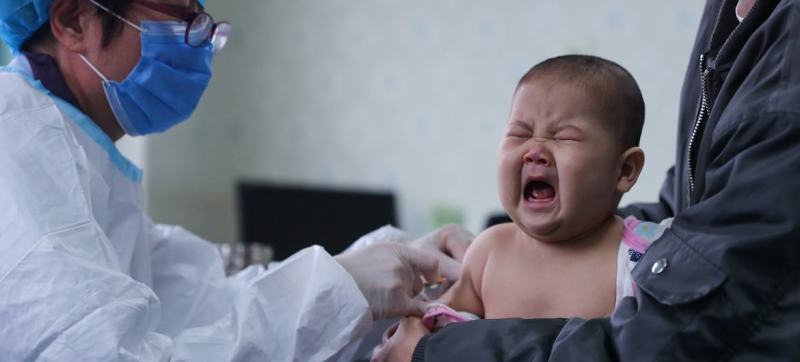- US May Ease Tariffs Further as Trade Gap Narrows |
- Arab-Islamic summit over Israeli strike on Doha Monday |
- NASA Rover Uncovers Strongest Hint of Ancient Life on Mars |
- Eminent Lalon singer Farida Parveen passes away |
- Dr Yunus mourns Farida Parveen's death |
Vaccine Campaigns Cut Outbreak Deaths by Nearly 60%

A six-month-old baby receives a vaccine at a health centre. Vaccines remain one of the most effective tools in global health by preventing the spread of deadly infectious diseases.
Emergency vaccination campaigns have reduced deaths from major infectious disease outbreaks by nearly 60 per cent since 2000, according to a new study published this week.
The study, conducted by Gavi, the Vaccine Alliance, in collaboration with Australia’s Burnet Institute and published in BMJ Global Health, analysed 210 outbreaks across 49 low-income countries over a 23-year period.
It found that rapid vaccine deployment during outbreaks of cholera, Ebola, measles, meningitis, and yellow fever led to estimated reductions in illness and deaths by nearly 60 per cent on average.
For diseases like yellow fever and Ebola, the impact was even more dramatic: yellow fever deaths dropped by 99 per cent, while Ebola fatalities fell by 76 per cent.
These findings highlight not only the effectiveness of emergency vaccination but also the critical role of preparedness and swift response to emerging health threats.
“For the first time, we are able to comprehensively quantify the benefit, in human and economic terms, of deploying vaccines against outbreaks of some of the deadliest infectious diseases,” said Sania Nishtar, CEO of Gavi.
“This study clearly demonstrates the power of vaccines as a cost-effective countermeasure to the increasing global risk of outbreaks.”
Gavi, the Vaccine Alliance, is a unique global partnership that helps vaccinate nearly half of the world’s children against deadly and debilitating diseases.
It brings together developing and donor governments, the World Health Organization (WHO), UNICEF, the World Bank, the Bill & Melinda Gates Foundation, and other partners to expand immunisation access.
Gavi also maintains global vaccine stockpiles for major diseases, managed in coordination with WHO, UNICEF, Médecins Sans Frontières (MSF), and the International Federation of Red Cross and Red Crescent Societies (IFRC).
In addition to reducing deaths and disability-adjusted life years, emergency vaccination during the 210 outbreaks studied generated nearly $32 billion in economic benefits — by averting premature deaths and life years lost to disability.
The study’s authors note that this is likely a conservative estimate, as it does not include broader social and macroeconomic impacts.
For example, the 2014 Ebola outbreak in West Africa — before vaccines were available — cost the region an estimated $53 billion. In contrast, later outbreaks where emergency vaccines were deployed saw deaths reduced by three-quarters and a significantly lower risk of regional spread.
The study breaks down vaccine effectiveness by disease:
Measles: Cases dropped by 59%, deaths by 52%
Yellow fever: Deaths fell by 99%
Cholera: Cases and deaths reduced by 28% and 36%, respectively (across 40 outbreaks from 2011–2023)
Meningitis: Cases and deaths fell by 27% and 28%, respectively (over 10 years)
Ebola: Fatalities reduced by 76%
These gains underscore how vaccines can make even the most lethal outbreaks manageable when deployed swiftly and strategically.
The COVID-19 pandemic was a stark reminder of vaccines’ value. According to The Lancet, vaccines saved an estimated 20 million lives globally in the first year of rollout.
However, the pandemic also disrupted routine immunisation, causing dangerous backsliding in coverage for diseases like measles and polio.
The Gavi study stresses that emergency vaccination must be paired with strong routine immunisation systems to prevent future outbreaks.
Looking ahead, Gavi’s 2026–2030 strategy includes expanding vaccine stockpiles, accelerating access for diseases like mpox and hepatitis E, and supporting preventive campaigns in high-risk regions.

